JK Rowling has been celebrating the Supreme Court’s landmark judgment that trans women are not legally women – but the Harry Potter stars who have vocally opposed her stance on gender identity have so far stayed silent.
Justices in London ruled last week that in the 2010 Equality Act, the definition of the term ‘women’ relates only to biological women.
Judge Lord Hodge warned against taking the ruling as a ‘triumph’ for either side, but gender critical campaigners have celebrated the finding as a victory.
Multi-millionaire author Rowling, who reportedly helped fund the women’s rights campaign group which brought the Supreme Court case, shared a photo online from on board her $150 million superyacht puffing a cigar in celebration.
She told her 14.3million followers on X, formerly Twitter: ‘I love it when a plan comes together.’
Yet while she has been commenting at length on social media about the Supreme Court decision, fans have noted the apparent silence from stars who featured in the blockbuster movie adaptations of her Harry Potter books.
Daniel Radcliffe, 35, and fellow Harry Potter stars Emma Watson, 35, and Rupert Grint, 36, have spoken publicly in support of gender ideology – that biologically male trans women should be regarded as women.
And they have each commented in opposition to Rowling’s views on the issue, while expressing their gratitude for her role in their careers.

JK Rowling has been celebrating the Supreme Court’s ruling on the definition of the term ‘women’ – posting this photo on X, formerly Twitter, from her $150million superyacht
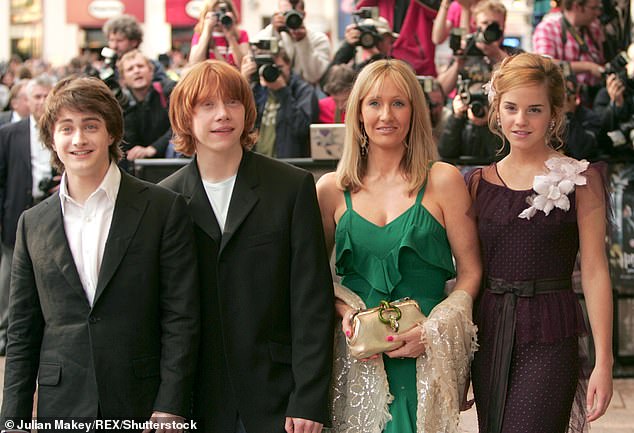
Pictured here, at the London premiere of the film Harry Potter And The Prisoner Of Azkaban in May 2004, are (left to right) Daniel Radcliffe, Rupert Grint, JK Rowling and Emma Watson
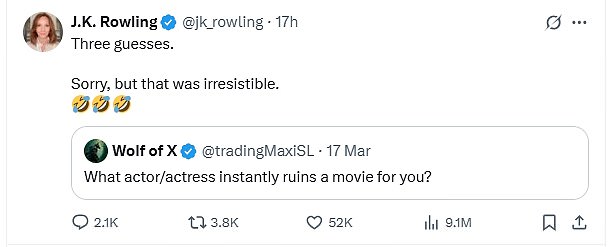
Harry Potter author JK Rowling appeared to aim an online jibe last month at the three young actors who have disagreed with her stance on gender issues
The author herself appeared to aim a jibe at them last month, when sharing on her X account a response to another user who asked: ‘What actor/actress instantly ruins a movie for you?’
Rowling wrote: ‘Three guesses. Sorry, but that was irresistible.’
And she previously indicated in April last year she would not forgive Radcliffe nor Watson as she criticised celebrities she said had ‘cosied up to a movement intent on eroding women’s hard-won rights’.
On that occasion the multi-millionaire author hit out at stars accused of using their ‘platforms to cheer on the transitioning of minors’ after the release of the long-awaited Cass report into gender treatment in the UK.
That government-commissioned study deemed there to be ‘remarkably weak evidence’ for gender-affirming techniques in children such as puberty blockers.
It also said that ‘for the majority of young people, a medical pathway may not be the best way’ to help when they are ‘presenting with gender incongruence or distress’.
When one fan said they were ‘just waiting for Dan and Emma [Watson]’ to offer a ‘very public apology’ knowing they’d be safe in the knowledge the author would forgive them, Rowling wrote: ‘Not safe I’m afraid.
‘Celebs who cosied up to a movement intent on eroding women’s hard-won rights and who used their platforms to cheer on the transitioning of minors can save their apologies for traumatised detransitioners and vulnerable women reliant on single sex spaces.’
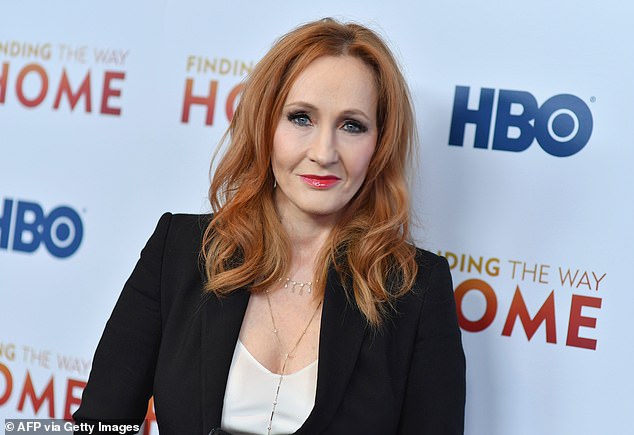
JK Rowling, pictured attending a world premiere of HBO’s Finding The Way Home in New York in December 2019, has been posting frequently about last week’s Supreme Court ruling
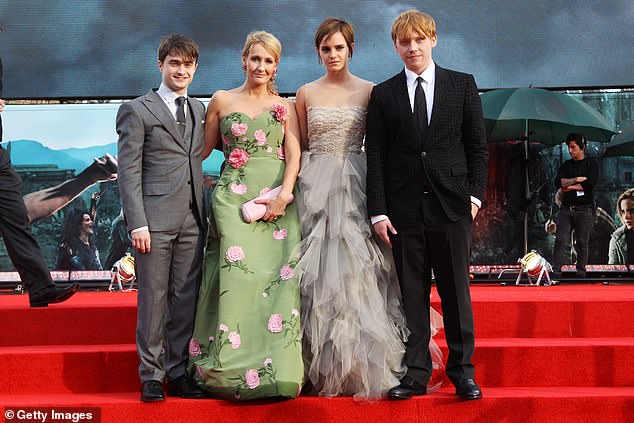
She is seen here, second left, alongside Daniel Radcliffe, Emma Watson and Rupert Grint at the world premiere in London of Harry Potter And The Deathly Hallows Part 2 in July 2011
Social media users have now been commenting on the apparent silence of Harry Potter film stars in relation to the new judgment by the Supreme Court.
Judges ruled that trans women with a gender recognition certificate (GRC) can be excluded from single-sex spaces if ‘proportionate’.
It marks the culmination of a long-running legal battle between the Scottish government and women’s group For Women Scotland over the definition of a ‘woman’ in Scottish law.
The case centred on whether somebody with a gender recognition certificate (GRC) recognising their gender as female should be protected from discrimination as a woman under the Equality Act.
The Scottish government had argued that such people were entitled to sex-based protections, meaning a transgender person with a GRC certificate identifying them as female would count towards women’s quota.
But campaign group For Women Scotland claimed they only applied to people born female.
The Supreme Court has now ruled that the words ‘sex’, ‘man’ and ‘woman’ in the Equality Act must mean ‘biological sex’, rejecting any alternative interpretations as ‘incoherence and impracticable‘.
Rowling reacted last Wednesday by posting on X: ‘It took three extraordinary, tenacious Scottish women with an army behind them to get this case heard by the Supreme Court and, in winning, they’ve protected the rights of women and girls across the UK. @ForWomenScot, I’m so proud to know you.’
She later added: ‘Trans people have lost zero rights today, although I don’t doubt some (not all) will be furious that the Supreme Court upheld women’s sex-based rights.’
In their 88-page ruling published today, the justices said: ‘The definition of sex in the Equality Act 2010 makes clear that the concept of sex is binary, a person is either a woman or a man.’
They stated: ‘A person with a Gender Recognition Certificate in the female gender does not come within the definition of a ‘woman’ under the Equality Act 2010 and the statutory guidance issued by the Scottish ministers is incorrect.’
Supporters of Rowling’s stance have used social media to accuse the young Harry Potter stars – who played the central trio of pupils in the movie franchise – of ‘disloyalty’.
Yet others have leapt to their defence, praising their previous comments on gender rights and saying they did not owe her anything more.
One poster wrote: ‘Who had ever heard of Rupert Grint, Emma Watson, or Daniel Radcliffe before JK Rowling made them millionaires?’
But another said: ‘Are actors contractually obliged to support the personal political beliefs of authors that wrote something a film they’re in is based on?’
Rowling’s evident disagreement with Radcliffe had begun after she called out an article that used the phrase ‘people who menstruate’ instead of women, writing: ‘I’m sure there used to be a word for those people. Someone help me out. Wumben? Wimpund? Woomud?’
Shortly afterwards, Radcliffe penned an article for an LGBT+ suicide prevention charity in which he insisted that ‘transgender women are women’.
He told The Atlantic last April that he had not spoken to Rowling for years, which upset him, but would not heed her call suggesting he should apologise to detransitioners harmed by puberty blockers.
He said: ‘I will continue to support the rights of all LGBTQ people, and have no further comment than that.’
Radcliffe added: ‘Jo, obviously Harry Potter would not have happened without her, so nothing in my life would have probably happened the way it is without that person. But that doesn’t mean that you owe the things you truly believe to someone else for your entire life.
‘It makes me really sad, ultimately, because I do look at the person that I met, the times that we met, and the books that she wrote, and the world that she created, and all of that is to me so deeply empathic.’
Radcliffe has long been a supporter of the Trevor Project, an LGBTQ suicide-prevention hotline and crisis-intervention resource.
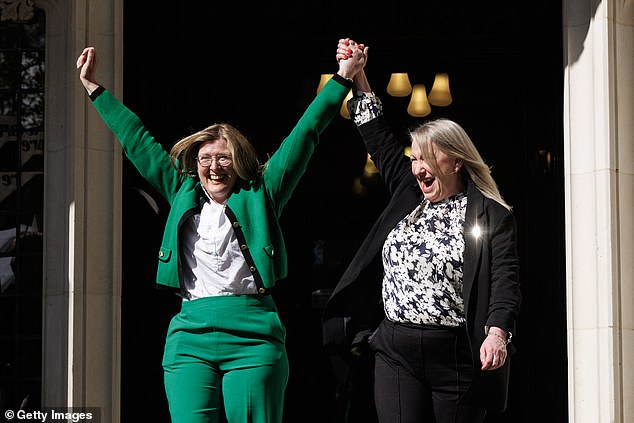
For Women Scotland directors Susan Smith (left) and Marion Calder (right) are seen celebrating the landmark ruling in London last Wednesday
He said: ‘I’d worked with the Trevor Project for 12 years and it would have seemed like, I don’t know, immense cowardice to me to not say something.
‘I wanted to try and help people that had been negatively affected by the comments.
‘And to say that if those are Jo’s views, then they are not the views of everybody associated with the Potter franchise.’
Radcliffe has spoken out in the past to say adults are ‘condescending’ for expressing misgivings over gender transitioning in children.
Speaking at a roundtable with six trans and non-binary children organised bythe Trevor Project in 2023, the actor said: ‘There are also people who also have a slightly condescending but well meaning attitude of, People are young, and it is a huge decision.’
The previous November he appeared to aim a thinly-veiled shot at Rowling by suggesting young, queer and transgender fans of the Harry Potter franchise were upset by her stance.
His comments seemed a barbed reference to Rowling’s tweets from June 2020 in which she ridiculed an article’s description of women as ‘people who menstruate’.
In response at the time, Radcliffe hit out at the author, saying: ‘To all the people who now feel that their experience of the books has been tarnished or diminished, I am deeply sorry for the pain these comments have caused you’.
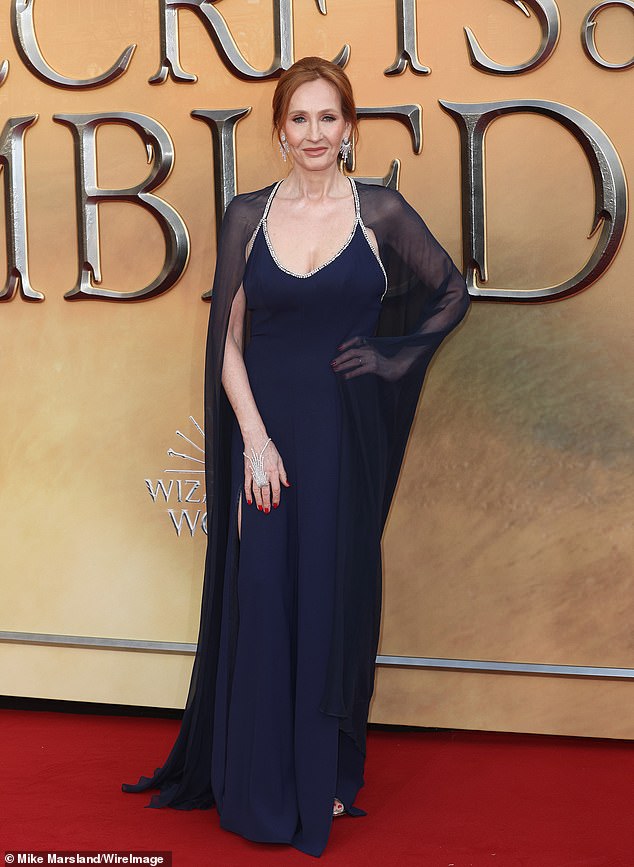
Harry Potter author JK Rowling, pictured in March 2022, been at odds with the three young main stars of the movie franchise based on her children’s novels about the boy wizard
Referring to Rowling’s comments, Radcliffe said that he wanted to let members of the LGBT+ community know ‘not everybody in the franchise felt that way’.
He added: ‘The reason I felt very, very much as though I needed to say something when I did was because, particularly since finishing Potter, I’ve met so many queer and trans kids and young people who had a huge amount of identification with Potter on that.
‘And so seeing them hurt on that day I was like, I wanted them to know that not everybody in the franchise felt that way. And that was really important.’
Meanwhile Watson, who became famous after playing Hermione Granger in the Harry Potter film series, has previously spoken out on the trans debate.
Ms Watson wrote: ‘Trans people are who they say they are and deserve to live their lives without being constantly questioned or told they aren’t who they say they are.
‘I want my trans followers to know that I and so many other people around the world see you, respect you and love you for who you are.’
Their fellow co-star Grint has also previously spoken up, telling the Times in 2020: ‘I firmly stand with the trans community and echo the sentiments expressed by many of my peers.
‘Trans women are women. Trans men are men. We should all be entitled to live with love and without judgement.’
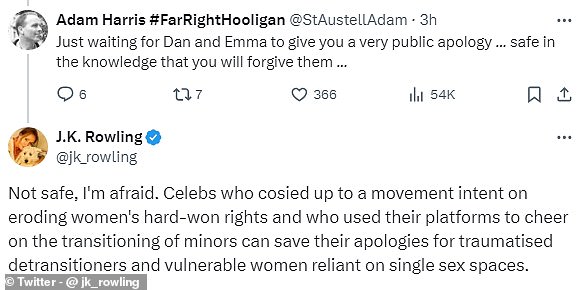
Rowling has said she is unlikely to forgive Radcliffe and Watson for taking the stance that they have on trans people
In March the following year, he explained his decision to voice his opposition to Rowling’s comments saying that while he has ‘huge respect’ for the author, he can still disagree with her views.
Speaking to Esquire, he added: ‘I am hugely grateful [for] everything that she’s done. I think that she’s extremely talented, and I mean, clearly, her works are genius.’
Elaborating on his reasoning, he added: ‘I think also you can have huge respect for someone and still disagree with things like that.
‘Sometimes silence is even louder. I felt like I had to because I think it was important to. I mean, I don’t want to talk about all that… Generally, I’m not an authority on the subject.
‘Just out of kindness and just respecting people. I think it’s a valuable group that I think needs standing up for.’
Last year’s official report by Dr Hilary Cass made a series of recommendations to overhaul NHS trans services to improve the care that children receive.
She ruled there was a ‘lack of high-quality research’ on the effects of giving children puberty blockers and hormones, and recommended that NHS England establish its own research programme.
The report also called for the creation a separate service for those wanting to ‘de-transition’, where a gender transition is stopped or reversed.

Radcliffe has previously called adults ‘condescending’ for expressing concerns over children transitioning. Pictured: The Harry Potter actor in New York on March 28, this year
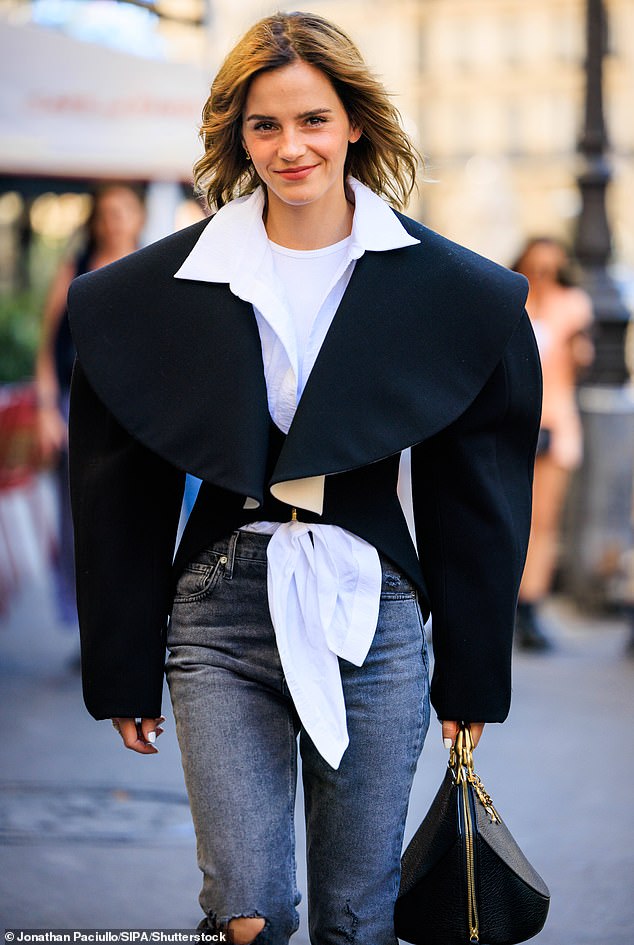
Emma Watson has also spoken out in the past in opposition to JK Rowling’s views on trans people (pictured in Paris in 2022)
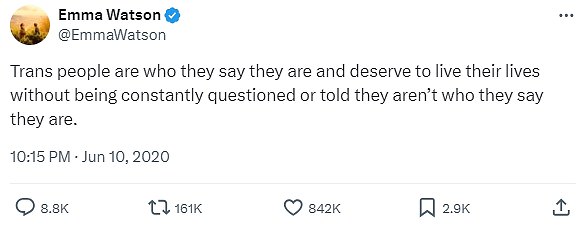
Watson has repeatedly spoken out in favour of trans rights both before (top) and after (bottom) Rowling’s comments in June 2020
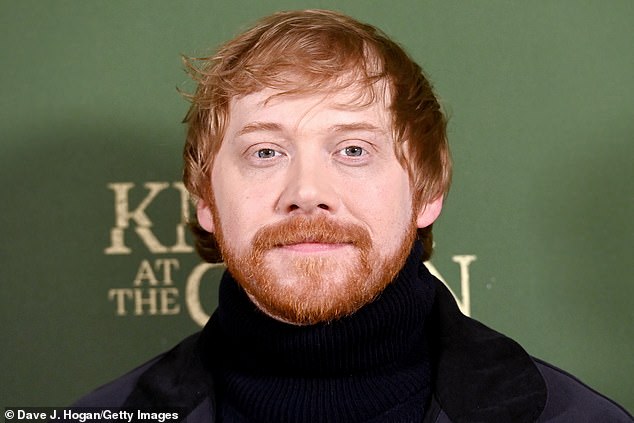
Rupert Grint, who played Ron Weasley in the Potter films, has expressed support for trans people but said he viewed Rowling as an ‘auntie’ which made his relationship with her ‘difficult’
And she recommended a ‘follow-through service’ for youngsters aged 17 to 25 to protect teenagers from ‘falling off a cliff edge’ in care when they hit 17.
Rowling was criticised in 2018 after she liked a tweet describing trans women as ‘men in dresses’ – with her spokesperson at the time describing the ‘like’ as a ‘mistake’, calling it a ‘clumsy middle-aged moment’.
But the author has since embarked on a campaign seeking to protect what she describes as women’s rights, fuelled by her own experiences of domestic abuse.
That campaign has seen her oppose legislation in Scotland that sought to make it easier for trans people to change their legal gender, and she has provided financial support to those fighting court cases challenging the legal status of trans people.
In a lengthy 3,600-word statement on her website published in 2020, she said her stance on trans rights was drawn from her experiences of abuse and sexual assault.
She wrote: ‘When you throw open the doors of bathrooms and changing rooms to any man who believes or feels he’s a woman… then you open the door to any and all men who wish to come inside. That is the simple truth.’
MailOnline has approached representatives of Radcliffe, Watson and Grint for comment.







